Children’s Park
The Arunagiri Children’s Park covers around 3 acres of land adjacent to the Forest Park and nursery. When work began in early 2004, the area was being used as a garbage dump. One palmyra palm and a solitary neem tree broke a scene of bare earth and plastic waste. There was also a filled in temple tank, whose upper walls were still showing, but which received no inflow of water as the channels were long blocked.
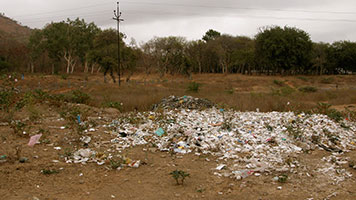
Before
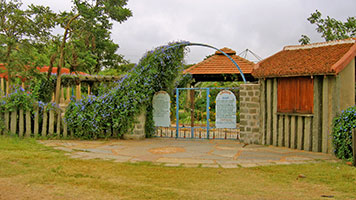
After
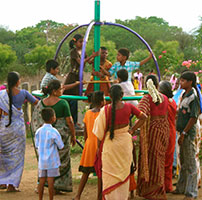
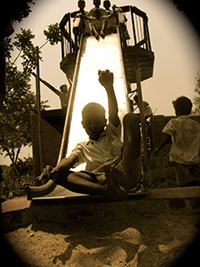 As plants started to grow and the first peices of equipment got installed, children from the neighborhood started wandering into the site, testing out the equipment, offering suggestions for what else should be made. All of the play equipment was made locally, much of it using recycled materials. Johnny returned from a ship breaking yard with cargo nets, life buoys and giant ropes, perfect play gear. We made slides from ferrocement, swings from tractor tyres, and mini-mountains from the mud that came out of the tank.Finally in 2005 all was ready and the park was opened with great fanfare. At that point no-one was sure how the town would take to this new space, but any doubts were instantly dispelled as the park became an instant hit. On Sundays balloon sellers, juice stalls, ice cream vendors and watermellon carts set up shop at the gates outside the park, and each and every week feels like a carnival. The popularity of the place means that the equipment takes a heavy load, and requires regular maintenance, but it’s a price well worth paying. Not only is it a joy to provide this unique place for local families to spend happy times together, but the creation of the park has created a huge store of goodwill and support for the serious ecological work that takes place just next to it.
As plants started to grow and the first peices of equipment got installed, children from the neighborhood started wandering into the site, testing out the equipment, offering suggestions for what else should be made. All of the play equipment was made locally, much of it using recycled materials. Johnny returned from a ship breaking yard with cargo nets, life buoys and giant ropes, perfect play gear. We made slides from ferrocement, swings from tractor tyres, and mini-mountains from the mud that came out of the tank.Finally in 2005 all was ready and the park was opened with great fanfare. At that point no-one was sure how the town would take to this new space, but any doubts were instantly dispelled as the park became an instant hit. On Sundays balloon sellers, juice stalls, ice cream vendors and watermellon carts set up shop at the gates outside the park, and each and every week feels like a carnival. The popularity of the place means that the equipment takes a heavy load, and requires regular maintenance, but it’s a price well worth paying. Not only is it a joy to provide this unique place for local families to spend happy times together, but the creation of the park has created a huge store of goodwill and support for the serious ecological work that takes place just next to it.
From our inception, The Forest Way has taken full responsibility for maintaining the park, it’s gardens, the play equipment and the infrastructure, as well as further additions. Entry to the park remains free to all.
Marudam Farm School
In 2010 The Forest Way was donated a piece of farmland about 6km from Thiruvannamalai, a huge leap toward our dream of creating a place where learning and living, farming and creative exploration could unfold together naturally, as they were always meant to do. Some of us were already involved in a small learning centre running on a rented property, so we soon set about building a permanent home for what would become Marudam Farm School.
Shifting to its new home in April 2011, the school now nestles comfortably in the farm, which is beginning to thrive around it. The children are in daily contact with the land, both in their play and their private explorations, and in the production of the food which we eat every day.
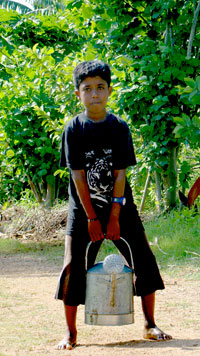 At Marudam we know that all children have an innate joy in learning, and it is our job to simply care for that. We also believe that learning is best when it is contextual and self-directed, and when it engages the child not just mentally, but emotionally and physically. So we focus more on the understanding of processes than the retention of information. We give equal importance to skills of communication, investigation and practical application as we do to conventional academics. Much of the work is through projects that connect the children directly to the world and the community that surrounds them. Each week the children spend one morning on Arunachala hill, walking, watching the birds, observing the changing plants and much more besides.
At Marudam we know that all children have an innate joy in learning, and it is our job to simply care for that. We also believe that learning is best when it is contextual and self-directed, and when it engages the child not just mentally, but emotionally and physically. So we focus more on the understanding of processes than the retention of information. We give equal importance to skills of communication, investigation and practical application as we do to conventional academics. Much of the work is through projects that connect the children directly to the world and the community that surrounds them. Each week the children spend one morning on Arunachala hill, walking, watching the birds, observing the changing plants and much more besides.
At least once every year the children write and put together a wonderful theatre production, with every child involved in the process, and the joy and confidence they get from this are priceless. Likewise the value they take from spending time with visiting craftspeople and artists.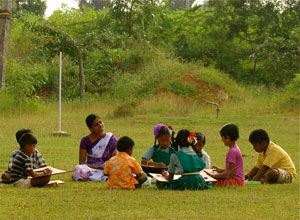
Relationships are important to us. First and foremost, the relationship of the child to herself or himself. Beyond that, to their friends and teachers, to the animals and the plants of the school, to the wider local community and on and on. The children of the school come from a very wide range of backgrounds. Through this personal experience of diversity, they are enabled to engage actively with differences while simultaneously looking past them into the heart of our commonality.
To learn more about the school and it’s educational approach, please visit the school’s website at www.marudamfarmschool.org
Environmental Outreach
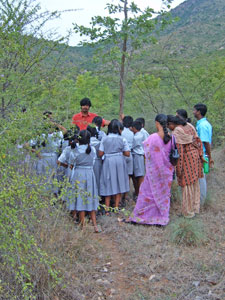 Throughout the year we invite local schools to visit the forest park and participate in the environmental programmes which we run there. We believe that while mental understanding of nature is important, deep love and care for the natural world is critical to all our futures. This active love and care come not from books or television, but from personal time spent in connection with non-human life.
Throughout the year we invite local schools to visit the forest park and participate in the environmental programmes which we run there. We believe that while mental understanding of nature is important, deep love and care for the natural world is critical to all our futures. This active love and care come not from books or television, but from personal time spent in connection with non-human life.
So the core intention of these visits is to allow children to simply connect with nature. This may be through a walk watching birds and butterflies, it could be planting a tree. It may be following the stream to the waterfall during the rains and taking a bath, or clambering up the rocks in the hot sun to look out across the plains. On the way we look for signs of animals. If it’s a school that comes often, we observe how the plants change with the seasons.
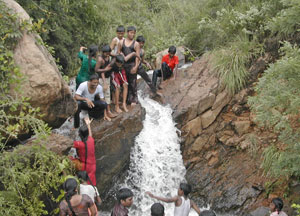 Back at the park there will be juice and a nutritious snack. There will also be a facilitated session looking at some aspect of nature in greater detail. The nature of these discussions will depend on the age group, and the subject matter may range from details in the lives of local plants and animals, to universal ecological principals and issues. The children may also have time to look at the paintings of the region’s wildlife, or to study the information boards.
Back at the park there will be juice and a nutritious snack. There will also be a facilitated session looking at some aspect of nature in greater detail. The nature of these discussions will depend on the age group, and the subject matter may range from details in the lives of local plants and animals, to universal ecological principals and issues. The children may also have time to look at the paintings of the region’s wildlife, or to study the information boards.
Preceding or following the discussion, there will be some time to help with our work, maybe mixing soil in the nursery, maybe mulching young trees. To round the day off, there’s always time to play in the children’s park before they go.
For those schools that do not have their own transport, we send our van to pick children up. For schools from farther a field we also conduct over night camps.
